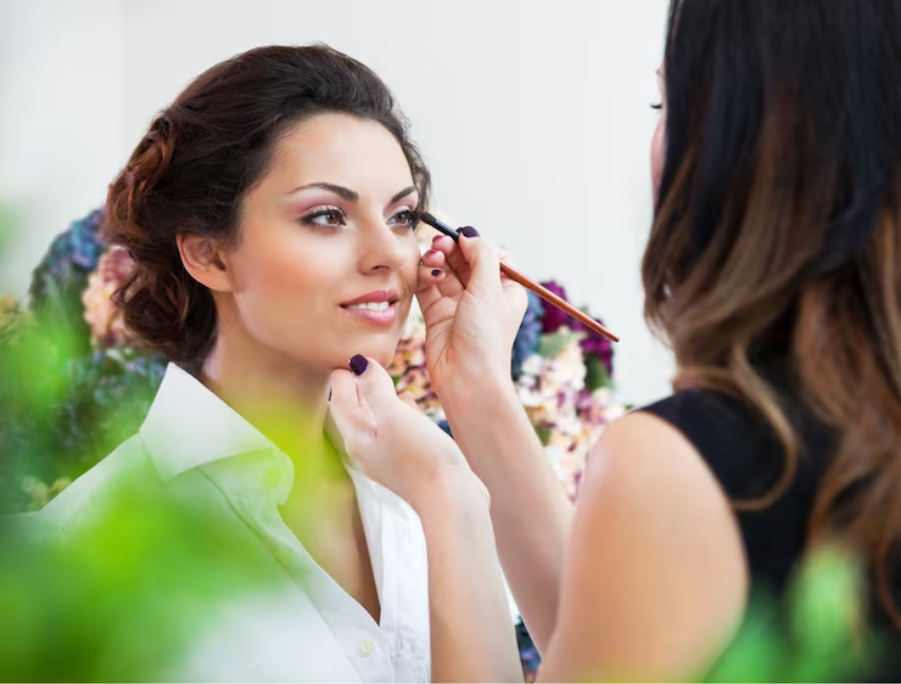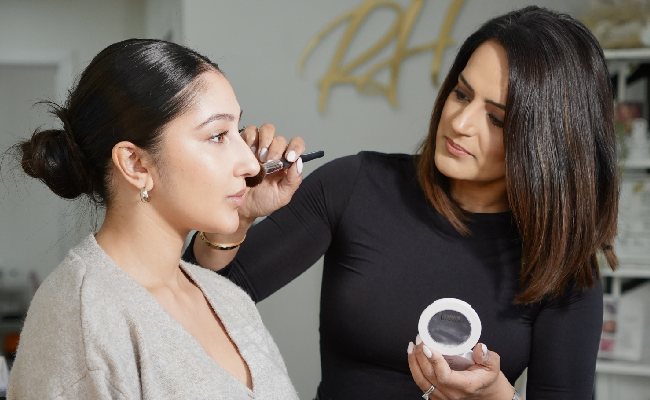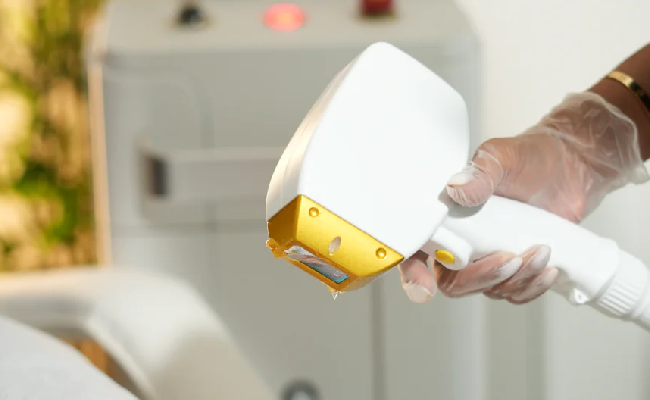
How Can Aspiring Makeup Artists Build a Successful Career?
Pursuing a career in makeup artistry is exciting, creative, and filled with endless opportunities—but success in this competitive field requires more than just skill with a brush. If you're wondering how to become a professional makeup artist, you're not alone. Whether you’re interested in bridal, editorial, fashion, or film makeup, the journey takes passion, practice, and persistence. At Raj Hothi, we understand the art and business behind beauty, and we’re here to help you navigate the path to a thriving career.
Why Should You Consider a Career in Makeup Artistry?
Makeup artistry is more than just applying products—it’s about transforming appearances, boosting confidence, and expressing creativity. A career in makeup offers:
- Flexible work opportunities, from freelance gigs to full-time positions in salons or media production.
- Diverse specialties, such as bridal, SFX, runway, or editorial.
- Global opportunities, working with brands, celebrities, or even on movie sets.
With beauty trends constantly evolving, there’s always something new to learn, making this field exciting and dynamic.
What Skills Do You Need to Become a Successful Makeup Artist?
Success in makeup artistry involves both technical and soft skills. Essential abilities include:
- Mastery of makeup techniques: contouring, highlighting, blending, etc.
- Color theory and facial structure knowledge
- Sanitation and hygiene practices
- Customer service and communication
- Time management and efficiency under pressure
Creativity is your foundation, but professionalism, consistency, and adaptability are what set top artists apart.
How Can You Get Proper Training and Certification?
To be taken seriously in the beauty industry, aspiring artists should consider professional education. You can choose:
- Cosmetology schools for in-depth learning and licensing
- Makeup academies that offer certificates in beauty, fashion, or media makeup
- Online courses and workshops for specific techniques
Look for courses that provide hands-on training, portfolio building, and networking opportunities. Many makeup artists also learn from mentorships or assisting seasoned professionals.
Should You Specialize or Become a Generalist in Makeup Artistry?
Eventually, specializing can help you stand out. If you enjoy working with brides and special events, for example, building a brand around hair and makeup for weddings and parties can be very rewarding.
While starting out, it's smart to explore various niches:
- Bridal makeup
- Fashion/editorial
- TV/film/SFX
- Theatre/stage
- Commercial or corporate shoots
How Can You Build a Professional Makeup Portfolio?
Your portfolio is your visual resume. Here’s how to create a strong one:
- Work with photographers, models, and stylists on collaborative shoots
- Include before-and-after photos
- Display a range of skin tones, face shapes, and styles
- Keep your images high-quality and well-lit
- Update it regularly to reflect your latest work and skills
Both a physical and online portfolio (through Instagram, website, or LinkedIn) are essential for attracting clients.
What Tools and Products Should Every Aspiring Makeup Artist Have?
Investing in a professional kit is essential. Start with:
- Foundation shades for various skin tones
- Concealers, powders, and blushes
- Eyeshadow palettes with versatile colors
- Eyeliners, mascaras, and brow products
- Lipsticks, glosses, and liners
- Skincare basics: primers, moisturizers, cleansers
- Disposable applicators and brush sanitizers
You don’t need every high-end brand—focus on reliable, inclusive, and hygienic products that deliver.
How Can You Market Yourself as a Makeup Artist?
Marketing is the engine behind a successful career. Strategies include:
- Creating a professional Instagram showcasing your work
- Building a personal website with portfolio, services, contact info, and testimonials
- Networking at industry events and with photographers, stylists, or influencers
- Collaborating with salons, wedding planners, and brands
- Offering referral discounts or introductory packages
Engage with your audience through tutorials, behind-the-scenes content, and client reviews to build trust and authority.
What Role Does Social Media Play in Career Growth?
Social media is your personal branding platform. Instagram, TikTok, and YouTube can serve as:
- A portfolio for potential clients and collaborators
- A platform for tutorials, trends, and transformations
- A hub for connecting with fellow artists and fans
Use hashtags strategically (#mua, #bridalmakeup, #makeuptransformation), engage with followers, and post consistently. The goal is to showcase your expertise and personality.
Should You Work Freelance or Join an Established Salon or Brand?
Both paths have pros and cons:
Freelancing:
- Flexible schedule
- Higher earning potential
- More control over services and branding
- Responsibility for booking, taxes, inventory
Working in a salon or brand:
- Stability and mentorship
- Exposure to clientele
- Structured hours
- Less business pressure
You can start in one and transition into the other. Many successful artists begin by assisting or working in salons before launching solo careers.
How Important Is Networking in the Makeup Industry?
Extremely. The beauty industry thrives on relationships. To grow your presence:
- Attend beauty expos, fashion shows, and masterclasses
- Join online forums or makeup artist groups
- Connect with photographers, hairstylists, and influencers
- Be reliable, punctual, and courteous—it gets you repeat bookings
Referrals and word-of-mouth are powerful—many clients come from someone who loved your work.
How Can You Handle Difficult Clients or Stressful Situations?
The job isn’t always glam. You'll face:
- Last-minute cancellations
- Demanding clients
- Tight timelines or unpredictable lighting
- Emotional wedding days or high-pressure shoots
The key is professionalism. Always:
- Communicate clearly
- Keep calm and confident
- Focus on solutions, not blame
- Prepare extra supplies in case of emergencies
Experience will help you manage these situations with grace and skill.
How Do You Keep Learning and Evolving as a Makeup Artist?
The beauty world is always evolving. Stay current by:
- Following industry leaders and trends
- Taking refresher courses or advanced workshops
- Practicing new techniques regularly
- Investing in continuous education
Even seasoned pros need to learn. Staying relevant and informed keeps you ahead of the curve and in demand.
What’s the Path to Becoming a Celebrity or Editorial Makeup Artist?
If you're aiming for the red carpet or fashion spreads:
- Assist established editorial or celebrity artists
- Build strong photography collaborations
- Focus on signature style and niche
- Be open to travel and irregular schedules
- Pitch your work to fashion magazines and online publications
It takes persistence, connections, and standout talent. But with effort, your work could be featured on major platforms.
What Is the Earning Potential for a Makeup Artist?
Earnings vary based on experience, location, and niche. For example:
- Freelance bridal artists can charge ₹10,000–₹30,000+ per client
- Editorial or film makeup artists earn per shoot or on contracts
- Salon-employed artists earn steady income plus commissions
- Top-tier celebrity artists can make six figures annually
Diversifying your services (e.g., offering hair and makeup packages, product recommendations, or training) can boost your income significantly.
What’s the Final Word on Building a Career in Makeup Artistry?
Becoming a successful makeup artist is about more than just passion—it's about continuous learning, strategic branding, and client relationships. Whether you're working solo, joining a brand, or starting your own business, the right foundation will take you far. Keep practicing, stay inspired, and always show up as your best self.
Just like Raj Hothi, you too can become a trusted name in beauty with dedication, discipline, and a love for transformation.
FAQs






